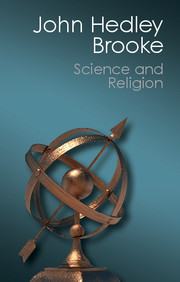Book contents
- Frontmatter
- Dedication
- Contents
- Acknowledgments
- Introduction
- I Interaction between Science and Religion: Some Preliminary Considerations
- II Science and Religion in the Scientific Revolution
- III The Parallel between Scientific and Religious Reform
- IV Divine Activity in a Mechanical Universe
- V Science and Religion in the Enlightenment
- VI The Fortunes and Functions of Natural Theology
- VII Visions of the Past: Religious Belief and the Historical Sciences
- VIII Evolutionary Theory and Religious Belief
- Postscript Science and Religion in the Twentieth Century
- Bibliographic Essay
- Sources of Quotations
- Index
Postscript - Science and Religion in the Twentieth Century
Published online by Cambridge University Press: 05 June 2014
- Frontmatter
- Dedication
- Contents
- Acknowledgments
- Introduction
- I Interaction between Science and Religion: Some Preliminary Considerations
- II Science and Religion in the Scientific Revolution
- III The Parallel between Scientific and Religious Reform
- IV Divine Activity in a Mechanical Universe
- V Science and Religion in the Enlightenment
- VI The Fortunes and Functions of Natural Theology
- VII Visions of the Past: Religious Belief and the Historical Sciences
- VIII Evolutionary Theory and Religious Belief
- Postscript Science and Religion in the Twentieth Century
- Bibliographic Essay
- Sources of Quotations
- Index
Summary
Introduction
The principal aim of this book has been to reveal something of the complexity of the relationship between science and religion as they have interacted in the past. Popular generalizations about that relationship, whether couched in terms of war or peace, simply do not stand up to serious investigation. There is no such thing as the relationship between science and religion. It is what different individuals and communities have made of it in a plethora of different contexts. Not only has the problematic interface between them shifted over time, but there is also a high degree of artificiality in abstracting the science and the religion of earlier centuries to see how they were related. As we saw in the opening chapters, part of what was meant by natural philosophy in the seventeenth century involved a discussion of God’s relationship to nature. Religious beliefs could operate within science, providing presupposition and sanction as well as regulating the discussion of method. They also informed attitudes toward new conceptions of nature, influencing the process of theory selection. In the eighteenth and nineteenth centuries, despite vigorous attempts to separate scientific and religious discourse, the meaning attributed to scientific innovations continued to be reflected in the often conflicting social, religious, and political uses to which they were put. Part of the meaning of Darwin’s theory for T. H. Huxley lay in its potency as an antidote to what he saw as the poison of Roman Catholicism.
At first sight, this complicated story would seem to have reached a much simplified conclusion in the twentieth century. With the emergence of more pragmatic conceptions of truth, such as we have just observed in William James, it has been much easier to insist on the mutual irrelevance of scientific and religious discourse – each reflecting distinct practices and preoccupations. Scholars who have followed Wittgenstein in analyzing the functions of language have recognized the several levels on which it may operate: The world may be described in many different ways, without any one having to be reduced to another. On such a view it is possible, in principle, for science and religion to coexist without mutual interference.
- Type
- Chapter
- Information
- Science and ReligionSome Historical Perspectives, pp. 438 - 474Publisher: Cambridge University PressPrint publication year: 2014



